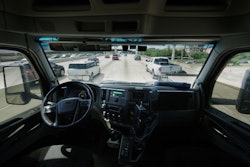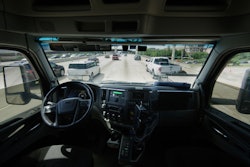Trucking news and briefs for Wednesday, May 21, 2025:
Aurora puts operator back in driver’s seat of autonomous trucks
According to a blog from autonomous truck developer Aurora’s CEO Chris Urmson, the company has added an operator back into its trucks operating an autonomous lane between Dallas and Houston.
The company announced driver-out operations on May 1, but Urmson said one of its OEM partners, Paccar, “requested we have a person in the driver’s seat, because of certain prototype parts in their base vehicle platform.”
Urmson said Aurora is “confident this is not required to operate the truck safely based on the exhaustive testing,” but decided to respect the request of their long-time truck manufacturer partner.
Aurora said it will be “moving the observer, who had been riding in the back of some of our trips, from the back seat to the front seat.”
That observer, however, will still not operate the truck, as “the Aurora Driver will continue to be fully responsible for all driving tasks, including pulling over to a safe location if required,” the company said.
The news comes just a week after reporting on the Texas legislature revealed lawmakers there floating a possible ban of fully driverless trucks on Texas roads.
Aurora touted that its autonomous driving system has safely operated for more than 6,000 miles along the route between Dallas and Houston, adding that the decision to put an observer back in the driver’s seat “has no impact on our near, mid and long-term development plans. Our partnerships are critical to our long-term strategy. We’re confident in the technology, grateful for our partners, and excited about the driverless road we’re on.”
[Related: Texas proposes driverless truck ban as Uber Freight, Hirschbach partnership takes off]
OOIDA expresses opposition to Trump’s ‘big, beautiful bill’
The Owner-Operator Independent Drivers Association on Monday penned a letter to Congressional leaders expressing their opposition to the U.S. House’s budget reconciliation package, known as the One Big Beautiful Bill Act.
The bill passed out of the House Budget Committee on Sunday night with a nail-biting 17-16 vote. The House Committee on Rules is scheduled to meet to discuss the bill at 1 a.m. Eastern time Wednesday.
In its letter to House Speaker Mike Johnson (R-Louisiana) and House Minority Leader Hakeem Jeffries (D-New York), OOIDA said the package as currently written “surprisingly looks far from beautiful. Not only has the House failed to include trucker’s top priorities, some of which we have been imploring legislators to remedy since 2017, but you have astonishingly included new taxes on our members. Regrettably, we are forced to oppose the legislation in its current form.”
First, the organization addresses the bill’s $5 million allocation for the Federal Motor Carrier Safety Administration to develop a public website that provides information on motor carriers that specifies whether or not a motor carrier meets FMCSA operating requirements. The provision would also require an annual $100 fee for each person seeking access to the website.
OOIDA noted that the U.S. DOT already publicly posts that information and raised concern over the potential that small-business truckers would have to pay the $100 fee to access the information. “Our members already pay numerous federal taxes and fees, and as part of this reconciliation process, we believe Congress should be eliminating unnecessary taxes, not creating new ones,” OOIDA said.
The group also expressed opposition to a provision of the budget package that makes certain TCJA permanent, specifically the elimination of the per diem deduction for employee drivers.
“We heard from members who received an unexpected tax hike after TCJA was enacted -- for as much as thousands of dollars more than they had anticipated,” OOIDA said. “As part of reconciliation, Congress should be restoring employee drivers’ ability to deduct daily meal expenses while on the road, not permanently increasing their tax burden.”
Finally, OOIDA expressed its disappointment that the House reconciliation package does not include a provision to repeal trucking’s Fair Labor Standards Act overtime exemption. The bill proposes to exempt overtime wages from taxes, but OOIDA said failing to remove the overtime exemption for truck drivers means that, “even if a motor carrier currently pays their drivers overtime (despite not being required), these overtime wages would still be taxed if the reconciliation package were enacted,” the group said. “This means truckers will be denied a new tax benefit guaranteed to virtually every other every blue-collar worker in America.”
If the bill passes the House Rules Committee and the full House, it will then move to the Senate for consideration.
[Related: Transportation budget proposal includes funding for carrier authority confirmation]
Pitt Ohio opens new maritime terminal in Virginia
Pitt Ohio (CCJ Top 250, No. 45) on Tuesday announced the grand opening of its new state-of-the-art maritime terminal in Norfolk, Virginia.
Strategically located just 10 miles from the Virginia International Terminals (Port of Norfolk), the 15,000 square foot, 37-dock door facility underscores the company’s commitment to providing seamless and efficient logistics solutions on the East Coast, the company said.
Pitt Ohio operates as a Non-Vessel Operating Common Carrier (NVOCC), overseeing the logistics of ocean freight transportation. This includes the coordination of inland transportation, customs clearance, and other related services. With asset-based operations featuring privately owned chassis, Pitt Ohio maintains complete control over its fleet and operations, guaranteeing a seamless and efficient service for importers and exporters.
"The Norfolk terminal represents a transformative milestone for Pitt Ohio and our clients,” said Chuck Hammel, IV, Vice President of Supply Chain. “Its strategic location, near the Port of Norfolk and our Richmond LTL terminal, offers an unparalleled advantage by facilitating seamless integration between maritime, inland transport, and warehousing. This synergy significantly reduces transit times and enhances overall supply chain efficiency, yielding substantial cost savings for our customers annually."










